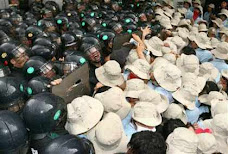
A cyclone's devastation is compounded by a criminal regime.
Wednesday, May 7, 2008; A20
ONLY SLOWLY has it become clear that the damage inflicted on Burma by Tropical Cyclone Nargis last weekend was catastrophic -- perhaps the worst natural disaster in the country's modern history, and a tragedy comparable to that suffered by Sri Lanka or Indonesia in the 2004 tsunami. By yesterday the official death count had risen to more than 22,000, with another 41,000 missing. International relief groups said dozens of villages in the heavily populated Irrawaddy Delta region were wiped out by a tidal surge 12 feet high; 95 percent of homes were destroyed in the township of Bogalay, with a population of 190,000. As many as 1 million people may be homeless.
The tardiness of the news as well as the inexcusable slowness in responding to it is due to Burma's secretive and shameless military regime, which once again is demonstrating its utter contempt for the lives of the country's 50 million people. As the cyclone approached last Friday, the government failed to warn the population. On Sunday it reported a total of only 351 deaths. On Monday morning -- as hundreds of thousands of people were fighting for their lives in the delta, and the country's largest city, Rangoon, was paralyzed by a power outage -- official media trumpeted plans not for relief, but for a referendum on a new constitution. Not until later on Monday did the generals grudgingly agree to U.N. offers to provide emergency relief. And by late yesterday, the first wave of U.N. personnel and other international relief workers were still waiting for visas to enter the country -- even though the disaster region is in desperate need of food, medical workers and emergency shelter.
Western countries that normally shun Burma are trying to help. The United States and European Union each pledged $3 million in aid, and President Bush yesterday offered the services of the U.S. Navy, which played a vital role in helping survivors of the tsunami in Indonesia. Yet there was no indication the regime would allow its people to be rescued. French Foreign Minister Bernard Kouchner said France had scaled back its aid offer because Burma's government was insisting on being the conduit for all relief.
In fact, the generals, who three years ago sequestered themselves in a remote new capital that was apparently unaffected by the storm, seem to regard the humanitarian crisis as a mere distraction. They remain fixated on the referendum planned for this Saturday, May 10 -- a day reportedly picked by their astrologers. Their constitution would institutionalize military rule behind a thin facade of democracy; for months the regime has been singlemindedly orchestrating what will certainly be a rigged vote.
Suggestions by relief organizations that the referendum might best be delayed fell on deaf ears. Not until yesterday did officials grudgingly announce a postponement in the hardest-hit areas. Like Mao's China or Kim Jong Il's North Korea, the Burmese regime would rather allow the deaths of tens or even hundreds of thousands than alter its pet political projects or allow foreigners free access to the country. Cyclone Nargis may become the grimmest episode yet in Burma's man-made catastrophe.































No hay comentarios:
Publicar un comentario